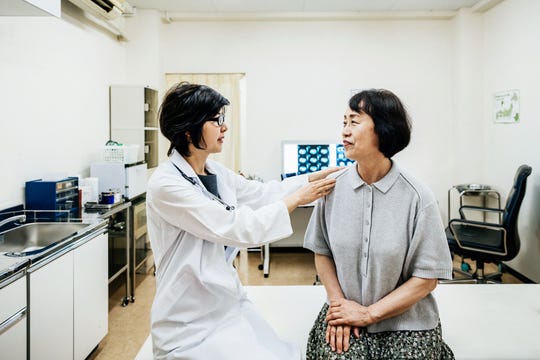The menopause mystique: What women need to know — and how to treat symptoms
 Menopause is a topic that’s not discussed as openly as some other health issues, even though half the population goes through it. Women experience menopause in different ways and at different ages, a variance that only adds to the mystique. Worse, women are sometimes embarrassed to talk about what’s happening. After all, it can be confusing to know which symptoms are from menopause and which are part of the normal aging process.
Menopause is a topic that’s not discussed as openly as some other health issues, even though half the population goes through it. Women experience menopause in different ways and at different ages, a variance that only adds to the mystique. Worse, women are sometimes embarrassed to talk about what’s happening. After all, it can be confusing to know which symptoms are from menopause and which are part of the normal aging process.
The definitions of menopause are also confusing. Menopause marks a moment in time: one year after a woman has not had her period. After that moment, she’s considered postmenopausal. Before her menstrual cycle ceases, when she’s experiencing irregular periods and other menopausal symptoms, she’s in perimenopause.
Here’s what you should know about menopause — and why it’s worth talking about and treating instead of being left undiscussed.
What to expect during menopause
Hot flashes are generally the best-known menopausal symptoms, but symptoms can also include irregular periods, vaginal dryness, breast tenderness, chills, pain during intercourse, mood changes, thinning hair and difficulty sleeping. Weight gain is often associated with menopause, said Dr. Anthony Salerno, a Rowan Medicine OB-GYN with offices in Stratford and Sewell. But this is a result of slowing metabolism and aging, and it’s experienced by men, too.
Additionally, due to aging, women experience an increased risk of cardiac disease, breast cancer, colon cancer and other issues, Salerno said.
 “We also worry about osteoporosis as a woman ages, especially if her estrogen levels have been very low, as estrogen prevents osteoporosis,” he said.
“We also worry about osteoporosis as a woman ages, especially if her estrogen levels have been very low, as estrogen prevents osteoporosis,” he said.
Estrogen is the main hormone involved in menopause, since it’s responsible for promoting female reproductive organ health and keeping vaginal tissue healthy, moisturized and supplied with blood.
“With the lack of elasticity, moisture and lubrication, intercourse becomes uncomfortable or even painful,” Salerno said.
The ovaries’ fluctuating hormone-production levels during perimenopause bring on the symptoms. The severity of symptoms depends partly on how quickly a woman loses her estrogen production. Because estrogen decline during perimenopause is irregular, symptoms can come and go. Each woman’s perimenopause is unique and can be gradual or quick, Salerno said, with mild to severe symptoms.
However, women who undergo surgical menopause experience rapid estrogen withdrawal when their ovaries are removed. Without treatment, the symptoms can be challenging. Menopausal symptoms typically last two to three years but can extend up to 10 years, said Salerno. That means even if a woman is postmenopausal, the symptoms can continue.
Types of treatment
Deciding whether and how to treat menopausal symptoms is up to each woman. A variety of natural approaches and medical treatments exist, each with pros and cons:
— Hormone treatments: Hormone replacement with either estrogen alone or estrogen plus progestin is an option, and Salerno recommends that women compare the risks and benefits.
“All women going through the menopause would feel better with estrogen replacement; however, estrogen is associated with some significant risks that some women therefore choose not to take,” he said.
Hormone therapies for menopause have been linked to a higher risk of stroke, heart attack and blood clots, though the risk returns to normal after stopping the therapy. Some studies also show a higher risk of women over 65 developing dementia if they’ve taken hormone replacement therapy. And women who take estrogen plus progestin have had higher diagnosis rates of breast cancer.
Hormone usage is associated with protective benefits, too. Studies have shown that taking estrogen alone is associated with a lower risk of breast cancer compared with taking a placebo. And taking both hormones is associated with a lower risk of hip and vertebral fractures.
Estrogen replacement can be safe if properly monitored, Salerno said. He sees patients several times as they begin estrogen replacement therapy, until they’re on a steady dose and doing well. He then sees patients yearly, ensuring that the women also get annual mammograms.
 — Antidepressant medications: Low-dose antidepressants have been shown to alleviate menopausal symptoms in women who choose not to take estrogen, Salerno said.
— Antidepressant medications: Low-dose antidepressants have been shown to alleviate menopausal symptoms in women who choose not to take estrogen, Salerno said.
— Herbal remedies: Some women say they experience relief using various dietary supplements. These supplements are not regulated by the U.S. Food and Drug Administration, though, and are not monitored for purity or effectiveness. Talk to your doctor before taking any over-the-counter remedies, as they could interfere with medications you’re taking.
— Stress relief: Some women find symptom relief through exercise, including yoga, Salerno said.
“The most common misconception about menopause is that nothing can be done about it,” he said. “Women will often suffer in silence rather than taking a proactive approach.”
Salerno hopes that more women understand that there are options for making an easier transition.
If you have menopausal symptoms and want to learn more about treating them, make an appointment with Dr. Anthony Salerno at Rowan Medicine by calling 856-589-1414.
